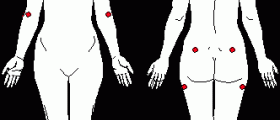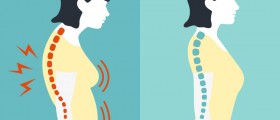
Fibromyalgia, fibrositis and fibromyositis are medical terms used to describe long-term pain in the body, affecting the muscles, joints, tendons and different other tissues in the body. Because of these pains, patients may also experience fatigue, sleep difficulties, headaches and mood changes such as anxiety and depression. According to the statistics, women are more susceptible to fibromyalgia than men. This disorder can affect people of all ages, but it usually affects women from 20 to 50 years of age.
Modern medicine doesn’t know exact cause of fibromyalgia yet. All doctors know so far is that in most cases patients experience body pains after some severe psychological stress, physical trauma, infection or after different surgical procedures. Abnormal response to pain may also be trigger factor for development of this disorder. However, there are certain cases where doctors can’t identify any triggering event, but patients still experience symptoms pointing to fibromyalgia.
Fibromyalgia Symptoms and Complications
Pain is the primary symptom of this disorder, especially on some spots on the body, known as tender spots. These are often found in soft tissue of the shoulders, on the back of the neck, on the lower back, sternum, hips, shins, knees or even at the elbows. Any physical activity, stress, anxiety or cold and damp weather may worsen the pain caused by fibromyalgia.
Besides sleeping problems and fatigue, these patients may also suffer from alternating diarrhea and constipation, irritable bowel syndrome (IBS), numbness and tingling in the hands and feet and decreased tolerance to exercise. Fibromyalgia patients could have memory problems, mood shifts and tension and migraine headaches as well.
Fibromyalgia is chronic problem and symptoms may or may not improve with the treatment. In some cases, patients may even feel worse than before. However, this disorder doesn’t provoke any other condition or disease and doesn’t cause further complications. Patients may have difficulties with functioning at home or at work due to the lack (or poor quality) of sleep.
Medications and Therapy Options
Treatment with the drugs and self-care are recommended courses of action for fibromyalgia patients. Doctors could prescribe pain killer medications like acetaminophen, tramadol, ibuprofen or naproxen sodium, some antidepressants (milnacipran, amytriptuline, fluoxetine/Prozac or duloxetine) and some epilepsy drugs, such as pregabalin and gabapentin.
Counseling is also recommended by many doctors, since it is found to be beneficial for these patients. Self-care methods include stress reduction, healthy lifestyle, proper sleep and proper amount of regular exercise.















-vs-Trigger-Points-(Myofascial-Pain-Syndrome)_f_280x120.jpg)

Your thoughts on this
Loading...